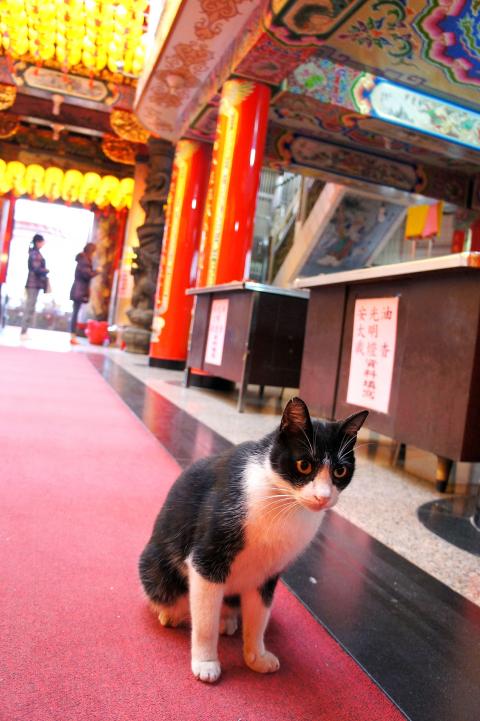A house of worship in New Taipei City’s (新北市) Sanchong District (三重) has become known as the “cat temple” (貓廟) for the friendly cats that reside there, attracting public attention as well as coverage by international media.
At the Yi Tian Temple (義天宮), playful cats leap around the altar, lie on the worshiping cushions and congregate near the temple’s incense altar to warm themselves on a cold day.
According to temple staff, the cats appear to have attained the same spirituality and perceptiveness as the temple’s worshipers, and seem to be listening attentively during the temple’s regular chanting sessions of Taoist and Buddhist texts.

Photo: Lai Hsiao-tung, Taipei Times
The cats also seem to act as hosts, welcoming worshipers by accompanying them through the ritual ceremonies and prayer sessions.
According to the temple’s staff, these 10 pious felines were once stray cats.
The temple is the center of religious worship in the area and it is dedicated to the goddess Matsu.
The front stairway leading to the temple is more than 20m long and several lanterns adorn the front gate. The cats were originally attracted to the temple by these lanterns, temple staff said.
A temple official said the cats stay in the temple due to the kindness of Wang Hsiuh-ying (王秀英), head teacher of the sutra chanting group, who was sympathetic to the plight of stray cats roaming the streets and started feeding them.
Over time, more cats settled in the temple and began treating it as their home, the temple official said.
The felines’ playful behavior has won many people’s hearts and the temple staff have given each of them a name based on their personality, the temple official added.
A worker at the temple said the cats are very tame and friendly, interact with strangers and often rub their body against worshipers’ legs.
He added that when money gets stuck in the slot of the temple’s donation box, the cats sometimes push down the bill with their paw “as if they were the temple’s guardians.”
The worker said that one of the felines was injured in a traffic accident, but after staff hung a protective Matsu amulet around its neck, it recovered from the injury quickly.
He added that a few years ago, a cat named “Niu Niu,” one of the temple’s first felines, went missing.
It was later discovered dead just a short distance from the temple.
Temple staff believe that in her old age, the cat knew she was nearing the end of her life, so she chose to leave the temple quietly for her final departure, a display of its spirituality, the staff added.

Left-Handed Girl (左撇子女孩), a film by Taiwanese director Tsou Shih-ching (鄒時擎) and cowritten by Oscar-winning director Sean Baker, won the Gan Foundation Award for Distribution at the Cannes Critics’ Week on Wednesday. The award, which includes a 20,000 euro (US$22,656) prize, is intended to support the French release of a first or second feature film by a new director. According to Critics’ Week, the prize would go to the film’s French distributor, Le Pacte. "A melodrama full of twists and turns, Left-Handed Girl retraces the daily life of a single mother and her two daughters in Taipei, combining the irresistible charm of

The Chinese Communist Party (CCP) is pushing for residents of Kinmen and Lienchiang counties to acquire Chinese ID cards in a bid to “blur national identities,” a source said. The efforts are part of China’s promotion of a “Kinmen-Xiamen twin-city living sphere, including a cross-strait integration pilot zone in China’s Fujian Province,” the source said. “The CCP is already treating residents of these outlying islands as Chinese citizens. It has also intensified its ‘united front’ efforts and infiltration of those islands,” the source said. “There is increasing evidence of espionage in Kinmen, particularly of Taiwanese military personnel being recruited by the

A Philippine official has denied allegations of mistreatment of crew members during Philippine authorities’ boarding of a Taiwanese fishing vessel on Monday. Philippine Bureau of Fisheries and Aquatic Resources (BFAR) spokesman Nazario Briguera on Friday said that BFAR law enforcement officers “observed the proper boarding protocols” when they boarded the Taiwanese vessel Sheng Yu Feng (昇漁豐號) and towed it to Basco Port in the Philippines. Briguera’s comments came a day after the Taiwanese captain of the Sheng Yu Feng, Chen Tsung-tun (陳宗頓), held a news conference in Pingtung County and accused the Philippine authorities of mistreatment during the boarding of

88.2 PERCENT INCREASE: The variants driving the current outbreak are not causing more severe symptoms, but are ‘more contagious’ than previous variants, an expert said Number of COVID-19 cases in the nation is surging, with the Centers for Disease Control (CDC) describing the ongoing wave of infections as “rapid and intense,” and projecting that the outbreak would continue through the end of July. A total of 19,097 outpatient and emergency visits related to COVID-19 were reported from May 11 to Saturday last week, an 88.2 percent increase from the previous week’s 10,149 visits, CDC data showed. The nearly 90 percent surge in case numbers also marks the sixth consecutive weekly increase, although the total remains below the 23,778 recorded during the same period last year,